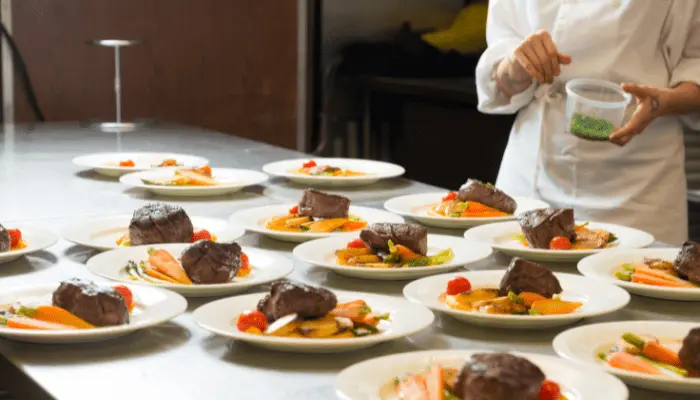When diners think of single-use packaging and food, they might picture a takeaway coffee cup or a packaged snack. But in reality, plastics in hospitality go far beyond the front-of-house. In the bustling kitchens of food service, plastic containers reign supreme — offering unmatched efficiency and convenience. Yet beneath their glossy exterior lies a troubling sustainability challenge, one that demands our attention and action.
The Hidden Impact of Plastics in Hospitality Kitchens
Imagine stepping into a professional kitchen where sustainability and hygiene are top priorities. Now imagine a fridge filled wall-to-wall with single-use plastic containers — many of them reused dozens of times. While these containers make food prep and storage easier, they come at a cost: to food safety, to brand transparency, and to the environment.
One Dish = Five Plastic Containers?
Take the example of a single pumpkin chicken risotto in a takeaway-ready kitchen:
- Risotto portioned into plastic prep containers
- Chicken and pumpkin in separate containers
- Final dish placed in a takeaway box
- Small containers for toppings or garnishes
That’s five plastic containers for just one order.
When this becomes the daily norm, the plastic waste in hospitality multiplies quickly.
But what if we reuse our prep containers?
Some venues reuse takeaway containers to cut costs — from plastic yogurt tubs to single-use mayonnaise buckets. But these weren’t built for repeated heat exposure. Over time they warp, discolor, and degrade, raising concerns about hygiene and chemical leaching. Would you feel confident serving your child reheated food from a melted plastic tub?
This everyday practice across commercial kitchens underlines the growing dilemma of plastics in hospitality operations.
Legislation & innovation – what needs to change
Efforts like the Single Use Plastic Acts in Queensland and Victoria are a step forward, targeting items like straws and cutlery. But operational plastic — the kind used behind the scenes in kitchens — remains largely unregulated.
That’s where innovation steps in.
Companies like Green Panda are pioneering compostable utensils made from recycled coffee grounds. These solutions offer real promise — but adoption depends on awareness, accessibility, and willingness to change.
Food Delivery and Unnecessary Plastic Waste
With food delivery now a permanent part of hospitality, packaging waste has exploded. Studies estimate that up to 80% of delivery plastics are avoidable. Swapping to compostable, recyclable, or reusable packaging can dramatically cut your footprint.
Learn how smart menu design also helps prevent waste →
What Can Your Business Do?
The plastics in hospitality issue isn’t just about containers — it’s about values, visibility, and responsibility.
✅ Audit your kitchen’s plastic usage
✅ Train your team on safer, sustainable alternatives
✅ Source compostable or reusable options for prep and service
✅ Collaborate with suppliers on plastic-free options
Need help? Explore our services for support on sustainability audits, training, and practical implementation.
Ready to Reduce Plastics in Your Operation?
At The Table, we help you take the first step. From sourcing compostable packaging to setting up smarter systems, we’ll guide you through achievable, realistic changes. Sometimes it’s just about knowing where to begin.
📞 Get in touch today for a free consultation on sustainable packaging and plastic reduction in hospitality.

